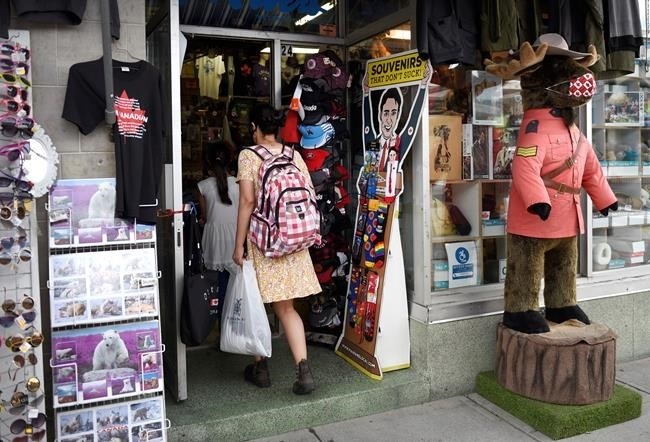
A moose in an RCMP uniform wearing a mask and a cartoon cardboard cutout of Prime Minister Justin Trudeau greet customers at a store selling souvenirs in the Byward Market in Ottawa, on Sunday, July 12, 2020, in the midst of the COVID-19 pandemic. A new survey by the Canadian Federation of Independent Business suggests that businesses in Canada’s city centres are struggling more than their rural counterparts.
Image Credit: THE CANADIAN PRESS/Justin Tang
August 20, 2020 - 5:00 AM
Before COVID-19, Dame Nature Restaurant — surrounded by a train station, hotel and offices in downtown Montreal — was boosted by its location. In a typical September, the restaurant relies on office workers and other commuters for traffic once the tourism season slows down, says manager Cezar Narea.
Now he envies the restaurants an hour outside the city, where locals hoping to avoid parking, construction and crowded sidewalks are flocking instead.
Dame Nature isn't the only business seeing the tables turn, according to a new survey by the Canadian Federation of Independent Business, which suggests that businesses in Canada's city centres are struggling more than their suburban and rural counterparts.
CFIB data released on Wednesday indicates that 22 per cent of businesses polled in urban cores are at normal levels of sales compared to 37 per cent in rural areas.
Overall, 66 per cent of survey respondents say their business is fully open, with 40 per cent are fully staffed and 28 per cent are making normal sales. CFIB represents about 110,000 small- and medium-sized businesses, and 5,119 members responded to the online survey, which ran from Aug. 13 to Aug. 18.
The polling industry's professional body, the Marketing Research and Intelligence Association, says online surveys cannot be assigned a margin of error because they do not randomly sample the population.
Like Narea, CFIB executive vice-president Laura Jones says that empty downtown offices and non-existent international tourism are likely to blame.
Narea estimates that sales are still down about 80 per cent, with the restaurant relying on a trickle interest from maitanence staff at nearby buildings. Once in a while, his regular patrons will drop by to say hello — only to announce they are picking up something from the office, where they won’t return until January 2021 or beyond.
With government support programs coming to an end, and trains remaining on reduced schedules, Narea says he is worried about whether they will lose their 12 former staffers for good.
"Everybody is trying to avoid downtown Montreal," he says. "It’s going to be a very bad situation for us."
This report by The Canadian Press was first published Aug. 19, 2020.
News from © The Canadian Press, 2020